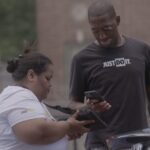
The Impact of a Conversation
The Impact of a Conversation By: Michelle George, National Director of CAC Operations The impact of a conversation can lead to many things. Have





A three percent increase in adoptions among people of color would give 2 MILLION pets a loving home.
97% of Animal Welfare holds an implicit bias against individuals from low socioeconomic status, and over 65% hold implicit bias toward Latin X and African Americans.
The work we do at CARE, Human and Animal Well-Being, addresses the bias within Animal Welfare in service to the field and marginalized people and their pets.
HUMAN AND ANIMAL WELL-BEING [HAW] is a unique, six stage, method of community support and advocacy that centers the well-being of people, in contrast to Animal Welfare’s traditional animal only focus. Few organizations work in the same way as CARE. As illustrated below, we start with building trust with community members before attempting to implement programming.
Our work begins with establishing trusting relationships within marginalized and underserved communities.
Learn More
We ask those closest to community challenges for their insights by way of Community Participatory Research [CPR]
Learn More
Insights gains from CPR and other studies guide CARE’s program design, partnerships, and resource distribution.
Learn More
Community Animal CARE is a shelter intervention program that supports communities with pets and their Proximate Leaders.
Learn More
Everything we learn from our community partners and research studies is hosted and shared through The Circle of Learning and Leadership.
Learn More
People of Color and marginalized communities suffer from negative stereotypes. Our Narratives tell a truer and more beautiful story about them.
Learn More
Our programs and their missions

📅 A year has passed since the deadly wildfires started in Los Angeles County on January 7, killing 31 people and damaging 16,000 buildings. Over the course of the month, 12 wildfires erupted in Los Angeles and Ventura Counties, fueled by drought and strong winds.
The Eaton Fire in Altadena is California`s second most destructive wildfire, followed by the Palisades Fire in Pacific Palisades. UCLA researchers estimate property losses could reach $131 billion. State officials requested $40 billion in federal assistance but have only received about $6 billion.
👩🏽⚖️ Federal investigators linked the Palisades fire to buried embers that smoldered after firefighters declared a January 1 brush fire extinguished. A 29-year-old Uber driver has pleaded not guilty to federal arson charges for starting the blaze.
The cause of the Eaton fire is under investigation, with the Department of Justice suing Southern California Edison for allegedly failing to maintain power lines that sparked the fire. In October, the utility began offering settlements to affected residents in Altadena.
💧 The Los Angeles Department of Water and Power is facing a lawsuit due to a loss of water pressure to fire hydrants in the Palisades. Survivors claim this issue could have been avoided if a key reservoir had not been drained. Additionally, survivors are suing Southern California Edison and Los Angeles County for delays in evacuations that contributed to the disaster.
California officials noted that the current president has not yet submitted the remaining $34 billion aid request to Congress, which contradicts his claim that his administration "saved Los Angeles."
🏘️ There are reported over 400 rebuilding projects in Pacific Palisades and plans for nearly 1,300 more. In Altadena, there are over 500 residential rebuilds underway and more than 1,800 planned, yet many residents are selling their properties due to rising costs.
#CAREequity #CARENews
…
💗 Trust doesn’t happen overnight, it’s earned through showing up and supporting folks when it matters most.
BIPOC-led organizations don’t need saviors, they need compassionate allies who respect the community’s Proximate Leaders who already have the knowledge and solutions — they just need the support.
🤝🏽 Whether it’s a conversation about vaccination rates among the neighborhood pets or a financial life raft in the form of Direct CARE emergency funds, CARE focuses on real relationships and practical solutions that lead to meaningful, accessible care for both people and their pets.
This approach has helped CARE support thousands of pet parents and furry friends across the country.
#CAREequity #HumanAnimalWelfare
…
🦷 Dental hygiene is one of the most overlooked parts of pet, but it shouldn’t be.
Conditions like periodontal disease and oral infections can quietly progress while causing daily discomfort.
🔍 Bad breath, swollen gums, or difficulty chewing can signal deeper issues like tooth loss or infection. In some cases, abnormal growths in the mouth may require veterinary evaluation.
Simple habits make a big difference. Brushing your pet’s teeth regularly, offering dental treats, and scheduling routine checkups can protect both their smile and their health.
🧡 Community Animal CARE (CAC) includes sharing information so we can prevent, treat at home and know when to call a Vet. Sharing is CARING.
#sharingiscaring #thankstomaddie #communityanimalCARE #petsandpeople
…
📄 A new report reveals a rise in housing discrimination, with fair housing advocates stating that the reported figures may underrepresent the true extent of the issue.
In 2024, the National Fair Housing Alliance @nationalfairhousingalliance logged 32,321 complaints, a 17 percent increase since 2014. The peak was in 2023, with 34,150 complaints. Lisa Rice, president of NFHA, credited the rise to ongoing educational efforts by nonprofits focused on fair housing.
📉 While the number of complaints may decline in the coming years, this does not necessarily indicate an improvement, according to the report. Due to funding cuts and policy changes, the number of organizations and federal employees available to address complaints is decreasing.
The report highlights complaints filed during the Biden administration but raises concerns that changes made under President Trump may discourage individuals from reporting discrimination.
🪓 The current administration eliminated Fannie Mae and Freddie Mac`s Special Purpose Credit Program, which was crucial for providing down payment and closing cost assistance to low-income and minority homebuyers.
Additionally, the administration canceled about $30 million in federal grants to nonprofit fair housing organizations, which processed most of the complaints recorded by the National Fair Housing Alliance in 2024.
In March, a Massachusetts judge ordered the Department of Housing and Urban Development to release the withheld grants; however, many funds remain unissued. This has led to the closure of several nonprofits, including the Fair Housing Center of Nebraska-Iowa and the North Texas Fair Housing Center.
💗 If individuals believe they are encountering housing discrimination, it is advisable to first reach out to their local fair housing agency for guidance and support. Additionally, they may consider filing complaints with state and local government entities as a further course of action.
#CAREequity #CARENews #Housing
…
💚 Our 2024–2025 Annual Report captures a year of active listening, meaningful research, and community-led action. CARE reached thousands of underserved pet parents and transformed lived experiences into insight-driven programs and advocacy rooted in reform and equity.
🐶 HAW (human and animal well-being) challenges the idea that animal welfare can exist without human well-being. This report shows what becomes possible when communities help shape the systems meant to support them.
#CAREequity #HumanAnimalWelfare
…

The Impact of a Conversation By: Michelle George, National Director of CAC Operations The impact of a conversation can lead to many things. Have

A Renewed Conversation about Pets and Housing Policy Expanding outside the very narrow topic of breed, weight, and size restrictions By: Lauren Loney In a span

Do the Right Thing: Embrace differences in adoption programs By: Brad Shear, CEO, Potter League for Animals 30 years ago, I started working at the front
